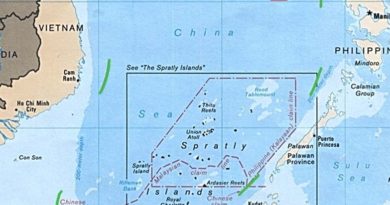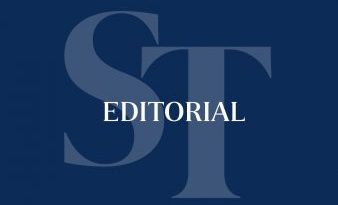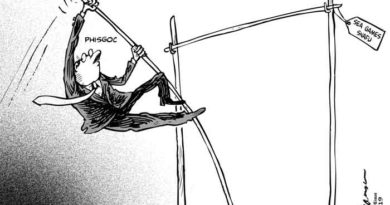OP ED COLUMN: NEWSSTAND By: John Nery- These 3 are real threats to democracy
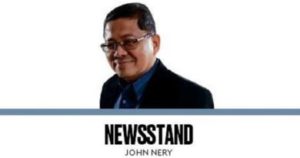
At the forum to mark the 10th anniversary of the Eisenhower Fellows Association of the Philippines last Friday, it was my role to kickstart a discussion that included Mahar Mangahas, Sen. Risa Hontiveros, Cielito Habito, and Jaime Augusto Zobel de Ayala. (Unfortunately, Gen. Charlie Galvez, AFP chief of staff and himself an Eisenhower Fellow, had to cancel on the morning of the forum.)
Allow me to post an excerpt from my speech. I drew a bleak picture of the changes already wrought by the Duterte administration: extrajudicial killings have become the new normal; the pivot to China is the new center of our foreign policy; the Marcoses are enjoying a period of rehabilitation. Then I pointed to three antidemocracy tools now in use:
– SPACE RESERVE FOR YOUR ADVERTISEMENT –
.
We will be living with the consequences of these changes for a long time to come. From them we can already sense danger. But the real threats to the democratic project lie inside the authoritarianism toolbox. Some of these tools are tried-and-tested; for the second successive year, I have had the privilege of serving on the board of judges of the World Justice Project’s Anthony Lewis Prize for outstanding rule-of-law journalism. Reading through the entries— for instance, those documenting democracy’s death throes in Poland or Turkey — I am struck by the shock of the familiar, and filled with foreboding.
Let me highlight only three of these antidemocracy tools.
A. The rule of law has been turned into a blunt weapon of executive action.
The first lawyer-president since Marcos, Mr. Duterte has a decidedly nonlawyerly attitude to the rule of law: Whatever works. He once infamously said that he used to plant evidence on or against suspects, when he was still a city prosecutor. He has since leveled up. His solicitor general’s specious arguments for a quo warranto judgment against the chief justice reflect his own partisan and utilitarian approach to legal cases.
His solicitor general enjoys “unwarranted influence,” to borrow the language [President Dwight] Eisenhower used [in his famous farewell address]. In the quo warranto case, the majority in the Supreme Court followed his lead—and marched right off the edge of the jurisprudential cliff. The dissenters on the Court were left to describe the “grave implications” of the justices’ collective fit. The majority used the case to “rewrite the Constitution,” Justice Antonio Carpio said. The ruling is a “legal abomination,” Justice Marvic Leonen said. The Court committed institutional suicide “without honor,” Justice Alfredo Caguioa said.
B. The institutions with weapons are being transformed into sources of executive legitimacy.
President Duterte seems to have responded to his initial awe of the professionalism of the military leadership by coopting them into his administration.
This, to borrow Eisenhower’s language, is a “combination” with “grave implications” for “the very structure of our society.” We must beware of what may turn out to be a military-political complex — I mean both the militarization of politics, through President Duterte’s active policy of hiring recently retired military generals or ranking officers, now around 30 in all, to staff the highest echelons of the government; and the politicization of the military, through the President’s repeated appeals to the military leadership to form a junta.
This is certainly dangerously “misplaced power,” in Eisenhower’s sense, and it puts “our liberties and democratic processes” at great risk.
– SPACE RESERVE FOR YOUR ADVERTISEMENT –
.
C. The executive is attempting to booby-trap public spaces with weaponized rhetoric, to control public speech.
I am old enough to remember when the direst threat to public discourse was the President’s coarse, sometimes abusive language. Then it became “fake news” and other forms of disinformation. Now, Brig. Gen. Antonio Parlade Jr. is painting 18 universities as communist recruiting grounds. The real threat to the democratic project is not the red-tagging, although that is serious in itself, but the complete misunderstanding of the role of universities in the shaping of the nation.
Parlade said video clips about human rights abuses under Marcos were being shown in these universities “to incite students to rebel against the government, incite resurgence of the First Quarter Storm experience among students while projecting President Duterte as the new Marcos.” But the teaching of the history of the Marcos martial law regime is required by law and demanded by justice; if the Duterte administration does not like being compared to the Marcos regime, it should not commit Marcosian abuses—such as resort to Parlade’s own scare tactic.
“Only an alert and knowledgeable citizenry,” to use Eisenhower’s terms again, can prevent the “disastrous rise of misplaced power.”
What can be done? What can we do?
We must all protect and promote countervailing forces — those ideas and institutions, those values and organizations, that push back when democracy comes under pressure. Pushing back is not tantamount to seeking the President’s ouster. Rather, it is the sometimes collective, sometimes individual action we need to take to preserve democratic space.
On Twitter: @jnery_newsstand. E-mail: [email protected]
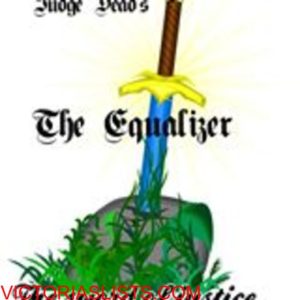 All photographs, news, editorials, opinions, information, data, others have been taken from the Internet ..aseanews.net | [email protected] |.For comments, Email to :D’Equalizer | [email protected]
All photographs, news, editorials, opinions, information, data, others have been taken from the Internet ..aseanews.net | [email protected] |.For comments, Email to :D’Equalizer | [email protected]







